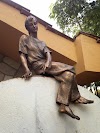Bishop Zwane Memorial Lecture
Bishop's remarks
This is the third “Bishop Zwane Memorial Lecture” we celebrate in our diocese and, I believe, we can now officially call it a diocesan tradition. One or two lectures might not make it so, but three probably put the foundation. I thank the Catholic Commission for Justice and Peace working under Caritas Eswatini for making it possible. I am very much aware of the amount of work it entailed.
After the first lecture - in which we particularly remembered the impact of Bishop Zwane in our diocese, in our country and in Southern Africa - having consulted our priests, I decided that the following ones would address topics he had at heart or that we believe he would have had at heart today.
I also decided that this lecture would be held every year on Saturday before the fourth Sunday of Easter (it is not so this year because the restrictions brought by COVID19 delayed us a bit). That Sunday - in the Catholic Church - is known as Good Shepherd Sunday and that is how we see and how we want to remember Bishop Zwane: as a Good Shepherd like Jesus.
Who does not remember Martin Luter King Jr speech in 1963: “I have a dream”?
Do we dare to dream? Are we free to dream? Are we free to openly talk about our dreams? Maybe we are, maybe we are not. Think of Joseph in the Bible and how their brothers hated him for his dreams: “Here comes that dreamer. Come on, let us kill him now and throw him down one of the storage-wells… then we shall see what becomes of his dreams” (Cfr. Gen 37: 18 – 20)
Dreams are able to grab the imagination of the people and therefore some are afraid of “dreamers” even today. They seem to upset the status quo we treasure so much.
I welcome the #justiceforthabani campaign as it challenges all of us: students, police, media, churches... in our understanding of “peace”. It helps us reflect on the type of nation, the type of society we want to be. At the same time this should also make us wonder about those who do not have any type of community support in their struggles and sufferings, feeling powerless and suffering in silence.
It is true - though - that the different Christian denominations understands God’s Word in a different ways. Enough to remember the Biblical foundations offered to justify “apartheid” in South Africa by some of the Christian Churches and how many other Christian Churches challenged the apartheid system based on their understanding of the same Word of God.
For the Catholic Church and from the Catholic Church there is a very important guideline. Since 1968 every year on January 1st the Church prays for peace. The Pope – Paul VI was the first one in 1968 – gives a message which helps us understand what we mean when we say “peace”. Think of just a few of them:
- 1969 – “The promotion of human rights, the way to peace” (Paul VI)
- 2002 – “No peace without justice, no justice without forgiveness” (John Paul II)
- 2009 – “Fighting Poverty to Build Peace” (Benedict XVI)
- 2017 - “Nonviolence: a Style of Politics for Peace” (Pope Francis)
- 2019 - “Good politics is at the service of peace” (Pope Francis)
In the same spirit, today we frame “a peaceful Southern Africa” in the context of Pope Francis' “Fratelli tutti” letter (All brothers and sisters) addressed to all people of good will. Fraternity and social friendship are the ways Pope Francis indicates to build a better, more just and peaceful world, with the contribution of all: people and institutions.
“Let us dream, then, as a single human family, as fellow travelers sharing the same flesh, as children of the same earth which is our common home, each of us bringing the richness of his or her beliefs and convictions, each of us with his or her own voice, brothers and sisters all.” (8)
Welcome to this year's lecture!
Click here for photos of the event



